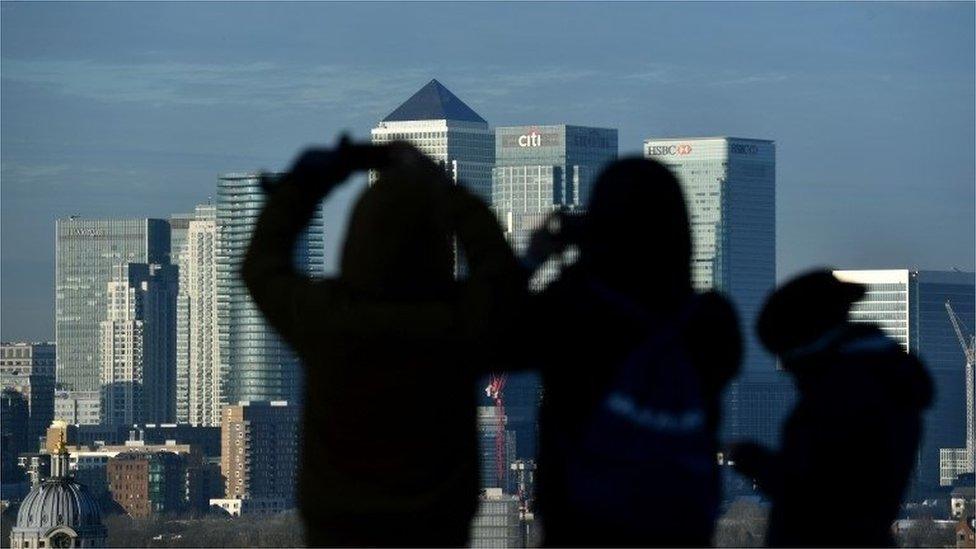Bank exodus?
- Published
- comments

Is the UK witnessing a sudden exodus of bankers in the wake of Theresa May's confirmation that the UK will be leaving the European single market?
In a word, no. At least not yet.
Yes, HSBC has confirmed it wasn't bluffing about moving 1,000 jobs to Paris. Yes, the chief executive of UBS has said it will "definitely" move up to 1,000 bankers. Yes, Goldman Sachs has slowed planned investment in London from New York.
So, Paris, Frankfurt and New York will all benefit from these firm commitments. But to describe the news of the last few days as an exodus is overdoing it.
Some 360,000 people in Greater London work in financial services, for the whole of the UK, that number rises to over a million. So far we have seen definite plans to move up to 2,000 jobs. A trickle, so far, rather than a flood.
Parisian charm
Nevertheless, there are some big players out there who are weighing up more radical moves.
Goldman Sachs is contemplating moving thousands (reports of 3,000 were dismissed today as speculation) of staff back to the European centres whence they came to huddle under a consolidated London roof.
JP Morgan is considering moving 4,000 staff - maybe more, according to CEO Jamie Dimon - to Europe or the US.
In both these cases - it's clear neither would rather move anyone. If a satisfactory deal is done between the EU and the UK on access to European customers, they would be happy to stay.
Paris is on a major charm offensive. It is promising to waive France's famously rigid labour laws. Its mandated 35-hour working week and the difficulty of firing people means that it's hard to cut a high-cost base when volatile banking revenues slump.
I'm also told it's offering special corporate and income tax rate sweeteners to lure banks and their highly paid staff.
Axel Weber, the chairman of UBS, told me he was sceptical there was the political flexibility to enshrine those inducements in law. And, as another bank insider said, if it's political risk you want to avoid - why pick France?
Breathing
The political risk point is an important one. France, Germany and probably Italy all have elections this year. It is very unlikely that UK negotiators will get full attention to their needs until they are out of the way.
That's why Axel Weber also predicted that we won't know the final arrangements till the 11th hour - meaning well into next year. Banks are spending big on contingency planning but are unlikely to pull the trigger until the fog clears.
Barclays boss Jes Staley: The UK will continue to be the financial lungs of Europe
In the meantime, London will continue to be Europe's financial centre.
As Jes Staley, the chief executive of Barclays told me this morning: "London will continue to be the financial lungs of Europe."
It's still possible a disorderly exit could cause pneumonia but, according to the boss of Barclays, London can breathe easy for now.

Where the big banks stand
Goldman Sachs: Had been moving parts of its "global operations" team to London, but is now "slowing that decision", chief executive Lloyd Blankfein told Bloomberg TV.
HSBC: Chief executive Stuart Gulliver told Bloomberg the bank was preparing to move 1,000 staff from London to Paris.
JP Morgan: Chief executive Jamie Dimon told Bloomberg that it looked like there would be more job movement [out of the UK] than the US bank had "hoped for".
UBS: Chairman Axel Weber told the BBC "about 1,000" of its 5,000 London jobs could be affected by Brexit.
Lloyds: Sources told Reuters that Lloyds Banking Group was considering setting up a subsidiary in Frankfurt, although no final decision had been taken.
Barclays: Chief executive Jes Staley told the BBC that while the bank may have to move some activities to Dublin or Germany he believed that most of its European banking business could continue to be done from the UK.
